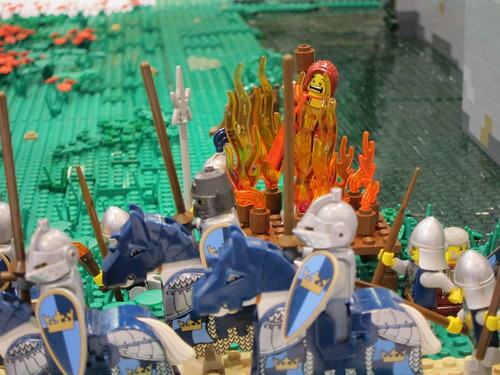We run our website the way we wished the whole internet worked: we provide high quality original content with no ads. We are funded solely by your direct support. Please consider supporting this project.
Why Greg Can’t be Accused of Marcionism (Let’s Not Burn Him at the Stake Just Yet)
Kristin Brenemen via Compfight
Richard Beck posted a blog today entitled It’s the Same God: On Marcionism, Creeds, Hermeneutics and War. You’re going to want to take the time to read through it in its entirety. Greg has been accused of Marcionism quite a lot as a result of the working out of his Cruciform Thesis. But while Marcion basically threw out the Old Testament, claiming that it portrayed a different God than Jesus shows us, Greg has insisted that the Old Testament is inspired, as Jesus clearly believed. So how do we resolve the tension between the portrayal of God we find in the Old Testament and the revelation of God we find in Jesus? That’s the hermeneutical conundrum that Greg has been working on for the last several years.
We’ll let you know when we have a publication date for Crucifixion of the Warrior God. It’s gonna be awesome! In the mean time, here’s a snippet from Richard Beck’s blog post.
We can see, now, the shape of the Marcion accusation toward pacifists. When pacifists pit Jesus against YHWH in the Old Testament they are of accused of Marcionism because, as the creeds tell us, “it’s the same God.” The assumption being that you can’t use Jesus to say that God is always, unequivocally against war. Because, clearly, God isn’t against war in the Old Testament. So God can’t always be against war because, again, “it’s the same God.” To suggest otherwise is to flirt with the Marcion heresy.
So that’s the argument. But I’d like to draw attention to the bait and switch going on.
Basically, the thing to note is this. The claim “it’s the same God” is, as we’ve seen, aconfessional rather than a hermeneutical assertion. More precisely, the confession “it’s the same God”–“We believe in one God, the Father Almighty, Maker of heaven and earth”–hands us a hermeneutical conundrum.
The confessional statement “it’s the same God” creates rather than solves the hermeneutical problem.
Category: General
Tags: Crucifixion of the Warrior God, Cruciform Theology, Hermeneutics, Marcionism, Pacifism, Richard Beck, War
Related Reading

Rethinking the Resurrection
As much as every other aspect of Jesus life and ministry, I submit that the resurrection must be understood in light of the cross. This event was not anything like the resuscitation of a random corpse. It was the resurrection of the Incarnate Son of God who had fulfilled the human side of the God-human…

The Greatest in the Kingdom (2 of 2)
Article by Natalie Frisk This post is a summary of what was discussed at the ReKnew CrossVision Conference in regard to what and how we teach our kids about the cruciform hermeneutic. Taking Jesus into the Old Testament I co-lead a family-friendly home church where we sometimes get into spiritually deep conversations with children. There…

The Lion, the Witch and the War
sandy Poore via Compfight Red Letter Christians featured some of Greg’s thoughts in their recent article entitled The Lion, the Witch and the War. The author of the article talks about the C.S. Lewis story and the subtle ways that it reflects his bias and has encouraged Christians to embrace a wrong-headed view of war. Really…

The Twist that Reframes the Whole Story
Many people read the Bible as if everything written within it is equally authoritative. As a result, people read it along the lines of a cookbook. Like a recipe, the meaning and authority of a passage aren’t much affected by where the passage is located within the overall book. The truth, however, is that the…

Getting Honest about the Dark Side of the Bible
Eddy Van 3000 via Compfight While most of the Bible exhibits a “God-breathed” quality, reflecting a magnificently beautiful God that is consistent with God’s definitive revelation on the cross, we must honestly acknowledge that some depictions of God in Scripture are simply horrific. They are included in what is sometimes called “the dark side of…

The Cruciform Center Part 4: How Revelation Reveals a Cruciform God
I’ve been arguing that, while everything Jesus did and taught revealed God, the character of the God he reveals is most perfectly expressed by his loving sacrifice on the cross. Our theology and our reading of Scripture should therefore not merely be “Christocentric”: it should be “crucicentric.” My claim, which I will attempt to demonstrate…

